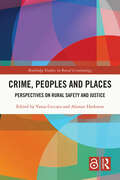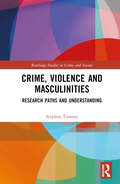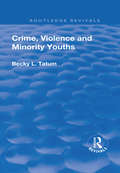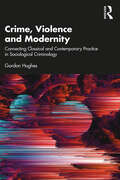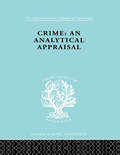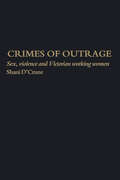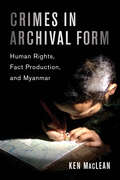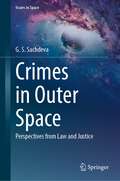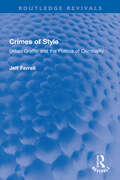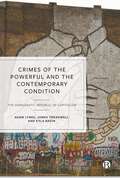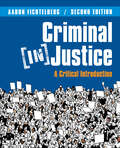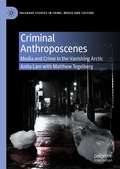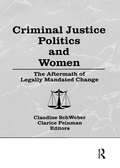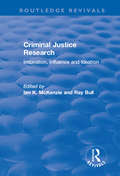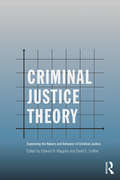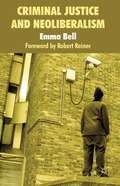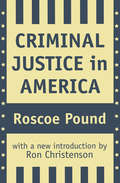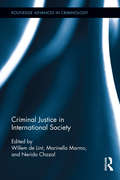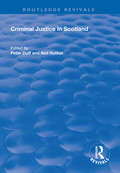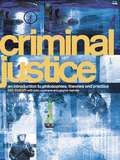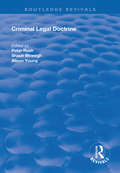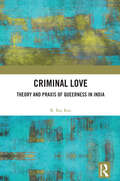- Table View
- List View
Crime, Peoples and Places: Perspectives on Rural Safety and Justice (Routledge Studies in Rural Criminology)
by Vania Ceccato Alistair HarknessBuilding on previous work in rural criminology, this book casts a global and comparative look across 19 countries, drawing on themes of crime and victimisation, safety and fear, practices of policing and police trust, and crime prevention practices.Combining reports on survey findings, country case studies, and crosscutting analyses, Crime, Peoples and Places offers empirical, theoretical, and policy-oriented contributions to the field of rural criminology, adopting the notion of a rural-urban continuum that captures the nuances of places of varied nature, spanning from remote and desolate spaces to accessible and connected environments of the urban fringe. The book examines the challenges of areas on the rural-urban continuum that are in constant transformation, given local and global influences, including the most recent developments in countries of the Global South. It identifies commonalities and disparities between different country cases, draws conclusions over global evidence, and highlights how partnerships, collaboration, and unity in crime prevention action can yield dividends for all people, regardless of age, gender, or whether they live in urban or rural areas.
Crime, Violence and Masculinities: Research Paths and Understanding (Routledge Studies in Crime and Society)
by Stephen TomsenProviding a detailed survey of the author’s work over three decades, this book chronicles Tomsen’s studies of interpersonal violence and masculinities, which initiated new approaches and topic areas and informed related theorising.These novel approaches in social science research sparked new pathways of understanding, which are outlined and evaluated in discussions of contemporary research and theoretical debates regarding masculinities and violence. The work reflects phases of study concerning (1) public (and related “private”) urban male violence; (2) anti-gay/anti-queer assaults and homicides, hate crimes, and the ambivalent official responses to these; (3) the ambiguous views of violence and different masculinities that are generated and circulate in criminal justice systems, and in popular (film and online) culture; and (4) frames of understanding masculine violence that have emerged in recent decades to further explain and address the apparent intractability of much offending, its relationship to related forms of social privilege or disadvantage, and preventive measures and programmes that are intended to counter this.Crime, Violence and Masculinities provides insight into the long-term production of knowledge about masculinity and gendered violence that will benefit readers engaged in researching these topics, as well as those with an interest in research results and their translation into related theory more broadly.
Crime, Violence and Minority Youths (Routledge Revivals)
by Becky L TatumThis title was first published in 2000: Mainstream criminology has devoted little attention to minority perspectives in crime and violence. Criminologists who have examined minority perspectives have addressed the issue in a cursory manner, providing only brief summaries of the propositions of the perspective. This book provides a comprehensive examination of one minority perspective on crime: the colonial model. Specifically, the book discusses how the colonial model applies to African and Hispanic Americans and what the perspective adds to mainstream theorizing. It further discusses the limitations of the perspective, revises the perspective to improve theoretical validity and subjects the revised perspective to empirical validation. Preliminary findings suggest that the colonial model is more effective in explaining African American delinquency.
Crime, Violence and Modernity: Connecting Classical and Contemporary Practice in Sociological Criminology
by Gordon HughesThis book makes an original contribution to reconnecting criminological inquiry to the core concerns of the classical sociological imagination and to the intellectual resources of comparative and historical sociology. Throughout the book Hughes challenges the long-standing division of labour in criminology and sociology more generally between ‘theory’, ‘method’ and ‘research’. Accordingly, the author’s concerns here are as much about the craft and working methods of being a sociological criminologist as it is about theory and concepts. In the first half of the book, the key conceptual and methodological premises of the classical sociological tradition are outlined and the latter’s potential for revitalizing contemporary criminological research-theorizing are assessed. These chapters also address the debate regarding the relationship between crime and violence, and that of modernity and the Western ‘civilizing process’. In the second half of the book, three areas of current criminological inquiry are explored through the lens of the long-term, process-oriented and radically relational perspective of contemporary Weberian and Eliasian scholarship. Among the areas of comparative investigation explored here are street crime, gangs and urban violence, genocide and murderous ethnic cleansing, warfare, colonialism and human rights. Written in a clear and direct style this book will appeal to students and scholars of criminology, sociology and all those interested in what a sociological lens brings to the practices of contemporary criminology.
Crime, shame and reintegration
by John BraithwaiteCrime, Shame and Reintegration is a contribution to general criminological theory. Its approach is as relevant to professional burglary as to episodic delinquency or white collar crime. Braithwaite argues that some societies have higher crime rates than others because of their different processes of shaming wrongdoing. Shaming can be counterproductive, making crime problems worse. But when shaming is done within a cultural context of respect for the offender, it can be an extraordinarily powerful, efficient and just form of social control. Braithwaite identifies the social conditions for such successful shaming. If his theory is right, radically different criminal justice policies are needed - a shift away from punitive social control toward greater emphasis on moralizing social control. This book will be of interest not only to criminologists and sociologists, but to those in law, public administration and politics who are concerned with social policy and social issues.
Crime: An Analytical Appraisal (International Library of Sociology)
by Manuel Lopez-ReyFirst published in 1998. Routledge is an imprint of Taylor & Francis, an informa company.
Crimes Against Humanity: Climate Change and Trump's Legacy of Planetary Destruction
by Judith BlauThe author is a sociologist who has written extensively on human rights and recently on climate change. In her new book she develops the idea that protecting everyone’s human rights and slowing planetary warming are the same goals. It is now clear that the leader of the richest, most powerful country in the world – United States President Donald J. Trump - has set the trigger of destruction by exempting the United States from the international treaty that aims to give the entire planet some reprieve from warming. That is, all countries of the world have entered into an agreement to end reliance on fossil fuels, except the United States, which withdrew at the outset of the Trump Administration. Regardless of the US position in the future, the country’s emissions are so very extremely high they will continue to wreck havoc on the entire world. While Blau maintains that President Trump has committed a crime against Humanity, even beyond his tenure the book sets the stage for a human rights approach to climate change for the future.
Crimes Of Outrage: Sex, Violence, and Victorian Working Women
by Shani D'CruzeThis provocative study explores the subordination of Victorian working women in the home, neighborhood, and workplace. Drawing on courtroom proceedings, D'Cruze reveals that women's interest in speaking out against violent crimes often coincide with the court's agenda to discipline the unruly behavior of working men. However, while women used local courts of vindicate their reputation before their neighbors, doing so often compromised their respectability in the eyes of the public.
Crimes in Archival Form: Human Rights, Fact Production, and Myanmar
by Prof. Dr. Ken MacLeanCrimes in Archival Form explores the many ways in which human rights "facts" are produced rather than found. Using Myanmar as his case study, Ken MacLean examines the fact-finding practices of a human rights group, two cross-border humanitarian agencies, an international law clinic, and a global NGO-led campaign. Foregrounding fact-finding, in critical yet constructive ways, prompts long overdue conversations about the possibilities and limits of human rights documentation as a mode of truth-seeking. Such conversations are particularly urgent in an era when the perpetrators of large-scale human rights violations exploit misinformation, weaponize disinformation, and employ outright falsehoods, including deepfakes, to undermine the credibility of those who document abuses and demand accountability in the court of public opinion and in courts of law. MacLean compels practitioners and scholars alike to be more transparent about how human rights "fact" production works, why it is important, and when its use should prompt concern.
Crimes in Outer Space: Perspectives from Law and Justice (Issues in Space)
by G. S. SachdevaThis book flags and contemplates the lurking problem of space crimes that may escalate and expand with diversification of space activities, greater footfall on the celestial bodies and passage of time, for the lack of appropriate solutions. It appraises the incumbent problems to evolve solutions and make recommendations regarding space crime situations. Recognizing current situation where commercial space travel has commenced, and space tourism is not far behind, the book takes a pole position on discussing the topic with its endemic challenges. Space transportation is expected to lead to commercial mining of celestial mineral resources from the Moon and asteroids, as has been found technically feasible and commercially viable. Space-specific products have been identified for industrial mining, processing, and manufacturing, for which manpower would be necessary, howsoever minimal, despite artificial intelligence devices. Blueprints for space habitations on the Moon and Mars are being prepared. In this scenario, where outer space and celestial bodies may soon be inhabited by multi-nationality, multi-ethnic and multi-cultural groupings of tourists, workers, and residents, given cramped and not so comfortable or private living spaces, attitudinal disparities and conflicting beliefs, differences, disputes, conflicts, and crimes are sure to raise their head. Economic activity and business culture may usher in crimes of competition and spying on intellectual property. Space crimes through technologies like cyber, lasers, etc., may also permeate the space domain for ill-intentioned abuses. The criminals may be individuals or collective groups or incognito terrorists. The book also discusses crimes and near-crimes that have already occurred in space but have been ignored or condoned. Absence of sovereignty on celestial bodies coupled with crimes in space or on celestial bodies, presents problems of jurisdiction, extradition, and other legal procedures. The dilemma of multi-national judicial systems, legal codes and norms of social justice need to be resolved by a specialized treaty reconciling major bends in the existing system vis-à-vis the nature of space crimes. Limitations in handling such crimes by the existing judicial system under established doctrines of international law by International Court of Justice or International Criminal Court, is highlighted in the book. It has strong take-aways for research scholars, law fraternity, diplomatic corps, judicial administration, policy-makers and the political class, enabling them to pro-actively initiate action for suitable answers.
Crimes of Style: Urban Graffiti and the Politics of Criminality (Routledge Revivals)
by Jeff FerrellFirst published in 1993, Crimes of Style investigates the politics of culture and crime through an in-depth case study of graffiti in Denver and the official response to it. Focusing on the most prevalent form of graffiti writing in Denver, the book provides a detailed consideration of the social and cultural circumstances that surround its creation. It explores the national and international development and reception of hip hop graffiti that provided the context in which Denver’s hip hop graffiti emerged. It also examines the reaction of Denver’s corporate and political community, highlighting the establishment of campaigns to criminalise it and identifying both Denver’s graffiti scene and the response to it as interwoven with broader cultural processes. Most significantly, the book puts forward the circumstances surrounding the phenomenal growth of, and subsequent attempts to suppress, hip hop graffiti as indicative of injustice and inequality within the United States.
Crimes of the Powerful and the Contemporary Condition: The Democratic Republic of Capitalism
by James Treadwell Adam Lynes Kyla BavinThe ultimate expression of power is the ability to act beyond the confines of law, with contemporary society enabling elite groups to wield “panoramic power”. From the murderous crimes of the corporate giants that provide us with life’s luxuries and necessities to the data gathering activities of media and educational institutions, the authors offer new thinking on damaging structures of power and privilege. This accessible book provides a comprehensive understanding of elite corporate wrongdoing, and the late capitalist society that enables harm, considering both how we got into this mess and how we get out of it.
Criminal (In)Justice: A Critical Introduction
by Aaron FichtelbergCriminal (In)Justice: A Critical Introduction examines the American criminal justice system and the social forces that shape it. Using a conversational voice, the book challenges readers to consider the inequalities in the criminal justice system as well as in the broader society it is designed to protect, then ask, "What can I do to make this better?" Author Aaron Fichtelberg uses a unique, critical perspective to encourage students to look closer at the intersection of race, class, gender, and inequality in the criminal justice system. Covering each of the foundational areas of the criminal justice system—policing, courts, and corrections—this book takes an in-depth look at the influence of social inequality, making it ideal for instructors who want students to critically assess the American criminal justice system in a very approachable way. This second edition comes at a time when there is a profound awareness that the criminal justice system reflects deep and systematic inequalities in American society and has been updated to include some of these monumental changes. This title is accompanied by a complete teaching and learning package. Digital Option / Courseware SAGE Vantage is an intuitive digital platform that delivers this text’s content and course materials in a learning experience that offers auto-graded assignments and interactive multimedia tools, all carefully designed to ignite student engagement and drive critical thinking. Built with you and your students in mind, it offers simple course set-up and enables students to better prepare for class. LMS Cartridge (formerly known as SAGE Coursepacks): Import this title’s instructor resources into your school’s learning management system (LMS) and save time. Don’t use an LMS? You can still access all of the same online resources for this title via the password-protected Instructor Resource Site.
Criminal (In)Justice: A Critical Introduction
by Aaron FichtelbergCriminal (In)Justice: A Critical Introduction examines the American criminal justice system and the social forces that shape it. Using a conversational voice, the book challenges readers to consider the inequalities in the criminal justice system as well as in the broader society it is designed to protect, then ask, "What can I do to make this better?" Author Aaron Fichtelberg uses a unique, critical perspective to encourage students to look closer at the intersection of race, class, gender, and inequality in the criminal justice system. Covering each of the foundational areas of the criminal justice system—policing, courts, and corrections—this book takes an in-depth look at the influence of social inequality, making it ideal for instructors who want students to critically assess the American criminal justice system in a very approachable way. This second edition comes at a time when there is a profound awareness that the criminal justice system reflects deep and systematic inequalities in American society and has been updated to include some of these monumental changes. This title is accompanied by a complete teaching and learning package. Digital Option / Courseware SAGE Vantage is an intuitive digital platform that delivers this text’s content and course materials in a learning experience that offers auto-graded assignments and interactive multimedia tools, all carefully designed to ignite student engagement and drive critical thinking. Built with you and your students in mind, it offers simple course set-up and enables students to better prepare for class. LMS Cartridge (formerly known as SAGE Coursepacks): Import this title’s instructor resources into your school’s learning management system (LMS) and save time. Don’t use an LMS? You can still access all of the same online resources for this title via the password-protected Instructor Resource Site.
Criminal Anthroposcenes: Media and Crime in the Vanishing Arctic (Palgrave Studies in Crime, Media and Culture)
by Matthew Tegelberg Anita LamThis book compares and contrasts traditional crime scenes with scenes of climate crisis to offer a more expansive definition of crime which includes environmental harm. The authors reconsider what crime scenes have always included and might come to include in the age of the Anthropocene – a new geological era where humans have made enough significant alterations to the global environment to warrant a fundamental rethinking of human-nonhuman relations. In each of the chapters, the authors reframe enduringly popular Arctic scenes, such as iceberg hunting, cruising and polar bear watching, as specific criminal anthroposcenes. By reading climate scenes in this way, the authors aim to productively deploy the representation of crime to make these scenes more engaging to policymakers and ordinary viewers. Criminal Anthroposcenes brings together insights from criminology, climate change communication, and tourism studies in order to study the production and consumption of media representations of Arctic climate change in the hope of to mobilizing more urgent public and policy responses to climate change.
Criminal Justice Politics and Women: The Aftermath of Legally Mandated Change
by Claudine Schweber Clarice FeinmanExperts provide important insights on the intent and subsequent outcome of legislated change at the national and local levels in the area of criminal justice and women. Here is a revealing examination of the impact of judicial and legislative changes on the treatment of female victims and offenders in the areas of corrections, domestic violence, sexual assault, and prostitution look at actual case studies demonstrates that the condition of women’s lives will not be changed merely by going to court or getting a new law. This is an enlightening book for readers who may believe that discrimination can be eliminated through legal changes alone.
Criminal Justice Research: Inspiration Influence and Ideation (Routledge Revivals)
by Ray Bull Ian K McKenzieThis title was first published in 2002: A collection of criminal justice researchers select a number of books, documents, papers and such like, that they believe to be important and influential in the field of criminal justice research. Each author has written a description and critique of the selected item and have discussed the impact of each of them with regards to formulating or developing their own research. The authors also speculate onb the direction they believe the area in question might be expected to develop in the first 10-15 years of the 21st century. The definition of crimnal justice, in this book, is a broad one, and that is reflected in the combination of criminologists, psychologists, sociologists and experts on social and public administration. In all the book attempts to examine the inspirations, influences and thought processes which underpin criminal justice research efforts.
Criminal Justice Theory: Explaining the Nature and Behavior of Criminal Justice (Criminology and Justice Studies)
by Edward R. Maguire David E. DuffeeCriminal Justice Theory, Second Edition is the first and only text, edited by U.S. criminal justice educators, on the theoretical foundations of criminal justice, not criminological theory. This new edition includes entirely new chapters as well as revisions to all others, with an eye to accessibility and coherence for upper division undergraduate and beginning graduate students in the field.
Criminal Justice and Neoliberalism
by E. BellThis book explores the origins of the so-called 'punitive turn' in penal policy across Western nations over the past two decades. It demonstrates how the context of neoliberalism has informed penal policy-making and argues that it is ultimately neoliberalism which has led to the recent intensification of punishment.
Criminal Justice in America (Quality Paperbacks Ser.)
by Roscoe PoundRoscoe Pound believed that unless the criminal justice system maintains stability while adapting to change, it will either fossilize or be subject to the whims of public opinion. In Criminal Justice in America, Pound recognizes the dangers law faces when it does not keep pace with societal change. When the home, neighborhood, and religion are no longer capable of social control, increased conflicts arise, laws proliferate, and new menaces wrought by technology, drugs, and juvenile delinquency flourish. Where Pound saw the influence of the motion pictures as part of the "multiplication of the agencies of menace," today we might cite television and the Internet. His point still holds true: The "old machinery" cannot meet the evolving needs of society. In Criminal Justice in America,Pound points out that one aspect of the criminal justice problem is a rigid mechanical approach that resists change. The other dimension of the problem is that change, when it comes, will result from the pressure of public opinion. Justice suffers when the public is moved by the oldest of public feelings, vengeance. This can result in citizens taking the law into their own hands--from tax evasion to mob lynchings--as well as in altering the judicial system--from sensationalizing trials to producing wrongful convictions. Ron Christenson, in his new introduction, discusses the evolution of Roscoe Pound's career and thought. Pound's theories on jurisprudence were remarkably prescient. They continue to gain resonance as crimes become more and more sensationalized by the media.Criminal Justice in America is a fascinating study that should be read by legal scholars and professionals, sociologists, political theorists, and philosophers.
Criminal Justice in International Society: Criminal Justice In International Society (Routledge Advances in Criminology)
by Willem De Lint Marinella Marmo Nerida ChazalThis book adopts a critical criminological approach to analyze the production, representation and role of crime in the emerging international order. It analyzes the role of power and its influence on the dynamics of criminalization at an international level, facilitating an examination of the geopolitics of international criminal justice. Such an approach to crime is well-developed in domestic criminology; however, this critical approach is yet to be used to explore the relationship between power, crime and justice in an international setting. This book brings together contrasting opinions on how courts, prosecutors, judges, NGOs, and other bodies act to reflexively produce the social reality of international justice. In doing this, it bridges the gaps between the fields of sociology, criminology, international relations, political science, and international law to explore the problems and prospects of international criminal justice and illustrate the role of crime and criminalization in a complex, evolving, and contested international society.
Criminal Justice in Scotland (Routledge Revivals)
by Peter Duff Neil HuttonPublished in 1999. Scottish criminal law and procedure are very different from their counterparts elsewhere in the United Kingdom. This book is the first socio-legal account of the Scottish criminal justice process and its constituent institutions. Its aims are: to explain the operation of the various elements which make up the ‘system’; to summarise the considerable volume of relevant Scottish research; and to locate this knowledge within contemporary theorising about criminal justice. To this end, the editors commissioned a team of experts to write chapters on the various stages of institutions of the Scottish criminal justice process. Given Scotland’s broad social and cultural similarities to the rest of the United Kingdom, the book also provides a useful comparative perspective which should help to discourage the tendency towards overly ethnocentric theorising south of the border.
Criminal Justice: An Introduction to Philosophies, Theories and Practice
by Ian Marsh Gaynor Melville John CochraneThis new text encourages students to develop a deeper understanding of the context and the current workings of the criminal justice system. The first part offers a clear and comprehensive review of the major philosophical aims and sociological theories of punishment, the history of justice and punishment and the developing perspective of victimology. In the second part, the focus is on the main areas of the contemporary criminal justice system, including the police, the courts and judiciary, prisons and community penalties.There are regular reflective question breaks which enable students to consider and respond to questions relating to what they have just read and the book contains useful pedagogic features such as boxed examples, leading questions and annotated further reading. This practical book is particularly geared to undergraduate students following programmes in criminal justice and criminology. It will also prove a useful resource for practitioners who are following vocationally based courses in the criminal justice area – in social work, youth justice and police training courses.
Criminal Legal Doctrine (Routledge Revivals)
by Peter Rush Alison Young Shaun McVeighFirst published in 1997, this volume examines questions of legal doctrine which have never been far from the study of crime. It has not always been able to keep the doctrinal aspects of law clearly in sight. There is always the pressure to turn to philosophy for the consideration of questions of moral and legal responsibility and to criminology and psychology for the analysis of action. The essays collected in this book turn again to questions of doctrine and consider the dogmatic order of law as the basis of the understanding of crime. It is the general argument of this book that without an understanding of the dogmatic order of the legal subject of crime, there will only ever be answers to questions that have never been appropriately asked. Loosely collected around questions of institution, judgement and address, these essays bring modern historical, doctrinal and cultural scholarship to bear on the practices of legal doctrine. Their aim is to offer an account of criminal law as a practice that institutes, judges and addresses the legal subject through a range of practices and knowledges. These range from the disciplinary knowledges of mental health to the cultural knowledges of femininity and female desire. They include the technical demands of law writing and court room procedure as well as symbolic powers of imagining corporate crime. These all are returned to the practical question of the production of knowledge through legal doctrine. These essays address a set of questions that have lain dormant in legal scholarship for much of the post-1945 era. In a time when the authority of law is being reconsidered at its foundations, it is appropriate too to reconsider the means and manner of the transmission of criminal law. Without an understanding of the formation of criminal law it is hardly surprising that questions of law reform raise such confusion.
Criminal Love: Theory and Praxis of Queerness in India
by R. Raj RaoThis book takes up the challenge of studying the wide gamut of lived reality of the Indian queer, against the backdrop of a set of theories. Written by a man who has been openly gay for the last 40 years, it dissects issues, concepts, and theories within the realm of queer studies against the day-to-day experiences of Indian queers. Drawing from personal and shared experiences, it highlights the sites of transgression within a seemingly monosexual society and analyses the aspects of the struggle of being queer in a repressive environment.This book comprises of three fundamental aspects of queerness relevant to us in India today—theory, culture, and politics, which has been primarily analysed through literature and film. The literature here includes references to the author’s own work as a practicing writer, as well as to that of other contemporary writers. It is an attempt to delink alternative sexuality from gender and establish it as an autonomous category.This book would be useful to the students, researchers and teachers of women and gender studies, sociology, history, economics, political science, and other interdisciplinary courses in social sciences. It will also be valuable reading for those interested in South Asian studies, especially post-colonial contemporary Indian society.
